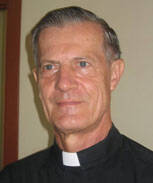The creation of dictionaries and grammars of languages in the Americas, Asia and India is one of the accomplishments for which Jesuit missionaries of past centuries were known. In order to bring the Gospel to the people, the missionaries first learned the local language. Then, having put it into written form, they could teach it to other missionaries.
Several months ago, at a conference on local churches around the world at the Jesuit School of Theology in Berkeley, Calif., I came across a modern variation of this traditional Jesuit enterprise. Simon Nsielanga, a young Jesuit Congolese student there, is now teaching others his own language, Nzadi. This obscure language is spoken in fishing villages along the Kasai River in Congo in the southwestern part of the Democratic Republic of the Congo. Simon is from one of those villages, Bundu.
Father Nsielanga is one of about 4,000 native speakers of Nzadi, and as far as he knows, he is the only Nzadi speaker in the United States except for the 10 students, their teacher and teaching assistant at the University of California in Berkeley who are learning the language in a course entitled Introduction to Field Methods, in the linguistics department.
How did this come about? A friend of Father Simon’s from Zambia introduced him to Professor Larry Hyman, and the exciting prospect of studying a language never before studied presented itself. Hyman explained: “There is nothing like the joy of discovering a language from scratch. We are putting Nzadi on the map.” Yes, Nzadi has now been added to the Ethnologue, the major database of human languages that currently lists 7,358 languages around the world.
Yet, sad to note, an estimated one-third of these languages are in danger of becoming extinct as children no longer learn the language of their parents. If these languages are lost before being recorded and studied, then the culture, the wisdom and experience, the ways of thinking and imagining that go with that language will be gone forever.
I asked Simon how the students have been progressing. He found them enthusiastic and challenged by this most unusual opportunity, noting that one difficulty is that Nzadi is a tonal language, in which change of pitch can make a great difference. He admires the energy and intelligence of the students but admits that he needs patience with them in learning the difficult tones.
Where is it all going? Professor Hyman hopes to assemble and publish a lexicon and grammar of Nzadi with the help of the students’ reports and papers. Already a lexicon, or dictionary, of 1,023 words has been put together.
Simon has found great personal satisfaction in this classroom opportunity. “I am happy to share this culture with the world, to preserve my culture,” he said. After completing his current graduate studies in social ethics, Simon hopes to return to Bundu, learn more about his culture, collect stories and proverbs, and eventually write a history of the Nzadi people.
Aware of dangers to planet earth, we frequently hear today of the loss of plant and animal species. Yet we also read of the discovery of new species. So too, the discovery of a new language or the preservation of a dying language in tapes, videos and books is worth celebrating. If each of the students in this linguistics class were to explore and document another language with the methodology they are learning as they study Nzadi, then 10 endangered languages might be preserved.
Mi épaya matond is the Nzadi expression for giving thanks. Surely this is one way that Professor Hyman and his students express gratitude to their teacher, Father Simon.








